How to choose the right bin for your business – and save money!
15th February 2021
Running a business is no small feat. The daily expenses quickly add up and with all the overheads, it can be a challenge to understand where you can save money. However, there is one area which is often overlooked, and that is your bin. Many business owners don’t know that simply choosing the right bin, can help to reduce costs by creating efficiency. In this blog, we outline how to choose the right bin for your business and ensure your money doesn’t go to ‘waste’ (no pun intended). While your business waste requirements are unique to you, here are some important questions to consider.
What type of waste does your business produce?
Firstly, you’ll need to find out what kind of waste your business is producing. Take a peek inside your bin(s), what do you see? Cardboard, paper, food waste, glasses, general waste (which is unrecyclable)? Do you produce confidential waste or hazardous waste? Establishing the type of waste your business generates is the first step to identifying the type of bin you’ll need.
How much of each type of waste is produced?
Here we look at the volume of each kind. What types of waste are you producing most of? For example, bars and restaurants might produce more food waste or glasses, whereas offices might produce more recyclable or confidential waste.
Look at where the waste is going – If you are producing a lot of food waste and this is being mixed in with the general waste bin, you might consider getting separate bins for the different waste streams.
How quickly do you produce each type of waste?
To help answer this question, look at your bins when it comes to the time of collection. If your bins are being collected once a fortnight and they are already overflowing, perhaps it’s time to reconsider the frequency of your collections. An alternative option would be to get a larger bin if you have space. Although it might sound counter-intuitive, having a larger bin which is collected less frequently, can be more cost-efficient than having a smaller bin which needs to be collected regularly.
What type and size of bin should you choose?
Now you have a rough idea of the type of waste and the volume your business produces, here’s a quick overview of the different sized bin options available and what they are each suitable for. Note that some bins will also have a lockable function to secure waste. This feature can prevent your bin to be used by unauthorised people and can help you prevent waste contamination.
The Eurobin – The most popular type of commercial waste bin is commonly referred to as a Eurobin (also known as a wheelie bin). They are ideal if your business produces smaller quantities of either general waste or recycling. They are either two wheeled, like your regular household waste bin, or four wheeled, which can hold a greater capacity. Eurobins are suitable for mixed recycling, paper, card, cans, plastic bottles, glass and general waste. The smaller sized Eurobins (140L to 240L) can also be used for food waste.
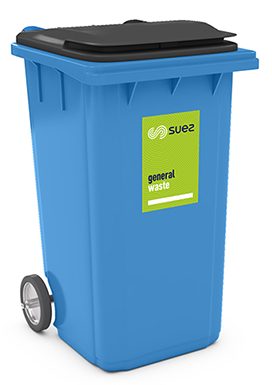
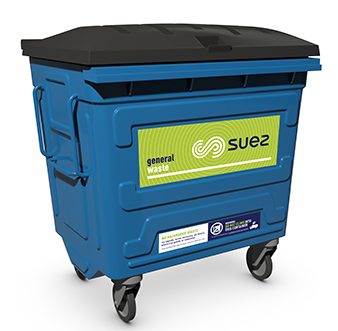
Two wheeled Eurobin size: 140L – 360L
Four wheeled Eurobin size: 660L -1,100L
The FEL – Front End Loaders or FELs are popular for sites that produce a high volume of either general waste or recyclable waste.
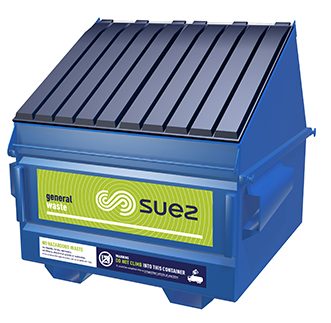
FEL size: 6 cubic yards – 10 cubic yards
The Skip – Skips can be used when you have additional non-compactable bulky waste, such as wood and rubble.
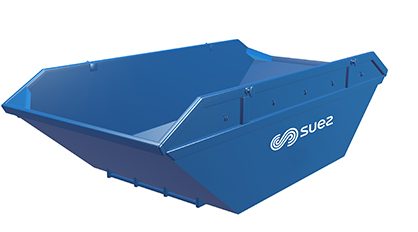
Skip size: 6 cubic yards – 14 cubic yards
The RORO – The RORO (roll-on roll-off), is similar in size to a shipping container. This is designed to handle larger quantities of recyclable or general waste. They can be used on an ad-hoc basis or permanently placed. The RORO is particularly useful if your company handles large bulky waste or a lot of construction waste.
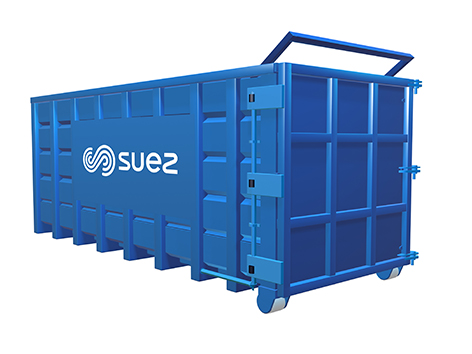
The RORO size: 15 cubic yards – 40 cubic yards
Still need help choosing?
Choosing the right bin will be depend on your individual business needs and capabilities. SUEZ recycling and recovery UK can help you choose the right bins and collection frequency to suit the amount of waste your business produces and the space on your premises. To find out more about how we can help, visit our website, or contact us.
Tweet

I have a hair salon so normally I put one Sita bag out once a week.
What I’d like to know is … if we have tea bags and bits of leftovers from lunch where should I put that? Do I take home and put in my own food bin?
Can, cardboard and plastic drinks bottles we recycle usually anyway.
Should it be like home and keep it all separate?
Hi Caroline, depending on quantity of food waste produced, you could consider commercial food waste collections (this could be potentially be shared with a neighbouring business). When food waste is added to general waste, it can make the bin heavier, increasing the cost, which is why sometimes a separate food waste bin is advised. In terms of the recycling, this can all go into a dry mixed recycling bin. More information here. Kind regards, SUEZ team.